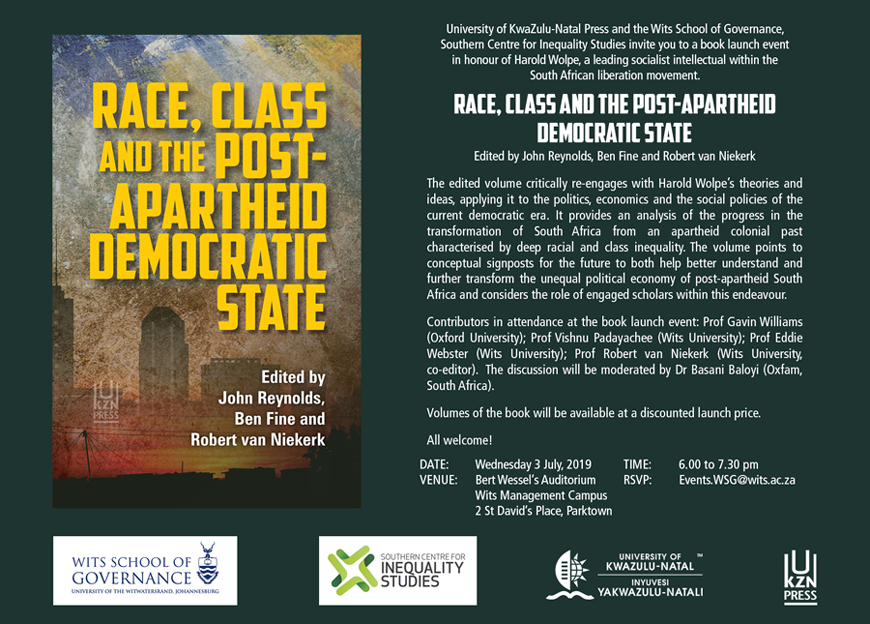Evidence Use to Strengthen Responses to Gender-Based Violence
CLEAR-AA will host this half day seminar on the use of evidence to strengthen responses to Gender Based Violence (GBV)
Submit a written poem, an artwork, or any form of expressive video on how it feels to be a woman/man in South Africa today to Talitha Hlaka at talitha.hlaka@wits.ac.za.
 Add event to calendar
Add event to calendar
Crucial Conversations
A discussion with Ann Bernstein and Professor Imraan Valodia.
Moderator: Stephen Grootes.
Respondent: Professor Murray Leibbrandt & Mamokete Lijane.
Everyone agrees that economic growth should be more inclusive. The question is how is this best achieved - by focusing on poverty reduction or by addressing inequality? Please join us in this discussion with Ann Bernstein, Executive Director of CDE and Professor Imraan Valodia, Dean of the Wits Faculty of Commerce, Law and Management.
 Add event to calendar
Add event to calendar
Entrepreneurship in the Township Economy
The township economy is thriving. Or is it?
There have been many initiatives, both public and private-sector led, to develop township-based entrepreneurs. Many such entrepreneurs, however, continue to struggle to access the resources and skills needed to launch and grow their businesses.
To commemorate ‘Youth Month’, Wits Business School is pleased to invite you to a panel discussion on the township economy with four inspirational and experienced entrepreneurs:
- Lwanga Cengimbo - founder of Lwanga Productions and Hustlepreneur
- Tiisetso Maloma - entrepreneur, researcher, publisher and author of The Anxious Entrepreneur and Township Biz Fastrack
- Bulelani Balabala - founder of Township Entrepreneurs Alliance (TEA) and CEO of IAF brands, a township-based award winning branding and print manufacturing company
- Leah Manenzhe – acting CEO of the Gauteng Enterprise Propeller (GEP)
The conversation will be facilitated by Pearl Maphumulo - Managing Director of The Business Development Agency, and recently named as one of the Top 100 Most Influential People in South Africa by Ghanaian’s Avance Media.
 Add event to calendar
Add event to calendar
Race, Class and the Post-Apartheid Democratic State
Revisiting Harold Wolpe in the Ramaphosa Era
The Wits School of Governance, Southern Centre for Inequality Studies and UKZN Press invite you to a book launch event in honour of Harold Wolpe, a leading socialist intellectual within the South African liberation movement.
The edited volume critically re-engages with Wolpe’s theories and ideas, applying it to the politics, economics and the social policies of the current democratic era. It provides an analysis of the progress in the transformation of South Africa from an apartheid colonial past characterised by deep racial and class inequality. The volume points to conceptual signposts for the future to both help better understand and further transform the unequal political economy of post-apartheid South Africa and considers the role of engaged scholars within this endeavour.
Contributors in attendance at the book launch event: Prof Gavin Williams (Oxford University); Prof Vishnu Padayachee (Wits University); Prof Eddie Webster (Wits University); Prof Robert Van Niekerk (Wits University, co-editor). The discussion will be moderated by Dr Basani Baloyi (Oxfam, South Africa).
Copies of the edited volume, ‘Race, Class and the Post-Apartheid Democratic State’ (2019, UKZN Press) will be available at a reduced cost.

 Add event to calendar
Add event to calendar
Will we have the Rule of Law or the Rule of (the Strong) Man?
The Mandela Institute cordially invites you to a public lecture to be delivered by Mark R. Shulman, Fordham Law School, New York
In an age of resurgent populist nationalism, strong men have assumed the leadership of governments around the world, from the multinational superpowers to small states with liberal traditions. Men such as Trump, Putin, Xi, most recently Balosaro appear to enjoy widespread support in their respective countries. To consolidate their power and serve their base, these strong men are attacking and degrading the systems of good government. How is the rule of law holding up against their efforts to subjugate countries to the “Rule of Man”? What lessons can we learn about maintaining the rule of law in the face of populist nationalists?
This lecture will examine some recent developments affecting key institutions of the rule of law and civil society. It will assess their significance, resilience and prospects for due process, equal protection and social justice. Key themes include:
- Autonomy of Judges
- Bar Associations and Independence of Legal Practitioners
- Prosecutors
- Non-Governmental Organisations
- Political Crimes
- Extra-judicial Killings
- Privacy and Surveillance
Mark R. Shulman teaches and writes about international law and international affairs. Prior to returning to teaching, he spent a decade in academic administration most recently as the inaugural Associate Dean for Global Admissions at New York University and before that as the first Assistant Dean for Graduate Programs & International Affairs at Pace Law School. Immediately prior to joining Pace, he created and ran the Worldwide Security Program at the EastWest Institute in New York and Brussels. This project followed several years of private practice in corporate law at Debevoise & Plimpton, a global firm based in New York.
An active member of the New York City Bar, he serves on the Executive Committee and has previously chaired the Committees on International Human Rights, Asian Affairs, International Affairs, and most recently National Security and the Rule of Law.
A teacher with almost three decades of experience, he teaches Human Rights at the Roosevelt House Public Policy Institute at Hunter College and International Law courses at Sarah Lawrence College and Fordham Law School. Over the years, he has also held teaching appointments at Yale, Columbia’s Law School and School of International and Public Affairs, the U.S. Air War College, and the China University of Political Science and Law. He has consulted on human rights and international affairs projects for the Rockefeller Foundation, and co-founded Next Generation Nepal and the Asian University for Women.
Mr Shulman holds a BA from Yale, an St. from Oxford, PhD in history from the University of California, Berkeley and a JD from Columbia.
 Add event to calendar
Add event to calendar
Philanthropy and Disaster Management Planning: The Aftermath of the Cyclones
The African Centre in Philanthropy and Social Investment at the Wits Business School will host this dialogue.
Regional leaders, NGOs, philanthropists, corporates, researchers, entrepreneurs and innovators alike to participate in a dialogue where discussions will be held about natural disaster impacts like cyclones Idai and Kenneth. How should African people and corporates be addressing the inevitable rise in disasters? What was done during cyclone Idai and Kenneth? What was not? How can we be part of the change in re building the affected African countries?
 Add event to calendar
Add event to calendar
External Validity in Economics: an Update
| When: |
Monday, 14 October 2019 - Monday, 14 October 2019 |
| Where: |
|
| Start time: | 12:30 |
| Enquiries: | Tholoana.Phoshodi@wits.ac.za |
On 14 October (Monday) we have Sean Muller from UJ presenting 'External Validity in Economics: an Update'.
 Add event to calendar
Add event to calendar
Johannesburg-Gauteng and the uneven world economic system
| When: |
Tuesday, 15 October 2019 - Tuesday, 15 October 2019 |
| Where: |
Senate Room
|
| Start time: | 18:00 |
| Enquiries: | Anna.Veileroglou@wits.ac.za / 011 717 1195 |
Professor Ronald Wall will deliver his inaugural lecture.
In a globalising world, city-regions increasingly compete to attract firms, trade and investment. These ‘place wars' occur at local, regional, national, continental and global scales, aimed at triggering economic growth through competitive advantage in leading industrial sectors. City-regions with the right political, economic, geographic, social and environmental ‘location factors', compete heavily with others to attract these needed resources. This has resulted in a highly uneven world, where a handful of city-regions control much of the world economy, helping boost their economic growth, equality levels and standards of living. However, this uneven distribution is often at the expense of other cities that suffer rising inequality levels. Professor Ronald Wall's inaugural lecture will address these issues and will discuss strategies on how to boost Johannesburg-Gauteng's growth, inclusiveness, equality and international position within the global economic system.
 Add event to calendar
Add event to calendar
Can Special Economic Zones drive growth in urbanising Africa?
As urban population growth in Africa continues to surge, so too does unemployment, informality and the growing bulge of disgruntled youth.
A staggering two-thirds of the investments in urban infrastructure required to support these populations by 2050, are yet to be made, or $93 billion per year[1]. Special Economic Zones, or SEZ’s, have become a popular instrument to try and achieve alleviate some of this backlog and achieve certain developmental ends. Within otherwise fragile economic areas in particular, they can provide a spatially concentrated productive area, with the adequate infrastructure, human capital, suppliers and low regulation that investors seek.
Given their potential to attract investment, SEZ’s are often used as a tool to uplift area’s that are lagging economically and are thus often focussed away from major urban centres. However, evidence suggests that this approach may be limiting large spill over benefits that occur when a city’s existing momentum is harnessed to create deep linkages between SEZ’s and the rest of the economy. Cities at their core are about the density and connectivity of people, who are able to share ideas and resources. They are able to provide what SEZ’s need: skilled and specialised labour, a wide variety of suppliers, and connectivity to national and global markets. Furthermore, rapid urbanisation means cities are our future, and we need them to be able to provide for our growing populations.
In this panel discussion, the IGC and Wits University bring together academic and policy experts to discuss whether allocating spatially concentrated areas in our cities to SEZ’s can contribute meaningfully to the creation of economic growth and jobs. Does the geographic placement of SEZ’s affect their linkages to the rest of the economy? Can they help to overcome the lack of industrialisation in many African cities to date? And further, could they even pose a solution to addressing the spatial inequalities that so prominently continue to reinforce social divides?
Speakers
Thomas Farole - Lead Economist in the World Bank's Social Protection and Jobs Global Practice
Michael Okyere Baafi - Executive Secretary of the Ghana Free Zones Board
Dr Susanne Frick - Fellow in Local Economic Development, London School of Economics (LSE)
Hanna Arayaselassie - Deputy Commissioner, Industrial Parks Division, Ethiopia
Chair - Lumkile Mondi - Senior Lecturer at Wits University, South Africa
Introductory remarks - Ronald Wall - Chair in Economic Development, Wits University, South Africa
Hosted by the International Growth Centre in partnership with the Wits School of Economic and Business Sciences
 Add event to calendar
Add event to calendar
Share
 Add event to calendar
Add event to calendar


